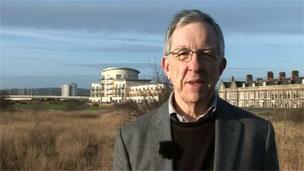Company's plan for coal gasification in Swansea Bay
- Published
An energy company has revealed it wants to apply for planning permission and a permit to drill for coal and extract the gas from under Swansea Bay.
Clean Coal Ltd has five licences around the coast of Britain and is trying to locate reserves which are off shore and too deep to be mined traditionally.
It is thought up to 1bn tonnes of coal could lie beneath the surface.
But environmental group WWF Cymru says the focus should be on renewable energy not fossil fuels.
During the past two years the Coal Authority, on behalf of the Department of Energy and Climate Change, have - without much publicity - issued 18 underground coal gasification (UCG) licences.
Most are off the east coast of England and Scotland. The 77 sq km Swansea Bay licence is the only one in Welsh waters.
Shaun Lavis, Clean Coal Ltd's senior geoscientist, said: "We're expecting to find up to around a billion tonnes of coal actually in place under the whole of Swansea Bay in our licence area.
"What we hope to do is undertake an exploration programme to identify an area of around 30 to 50m tonnes or so of that coal that's suited for underground coal gasification."
He said UCG was more controlled than burning and did not produce as much heat and carbon dioxide.
He added: "Furthermore, what happens when you gasify the coal in the subsurface, is that a lot of the ash, or most of the ash and sulphur compounds will actually stay underground as well, so you don't have the issues with ash disposal and so forth that you might do with a conventional coal-fired power station."
The basic idea of UCG is that you find coal seams which are up to 500m (1,641 ft) underground - far too deep to mine, and probably too expensive and dangerous as well.

WWF Cymru believes there could be better alternatives
After drilling to find coal, a newer technology of horizontal drilling modified from the oil industry would then allow air and oxygen to be injected down to ignite the coal.
Oxygen combusts with the coal-producing synthesis gas - a combination of carbon dioxide, carbon monoxide, methane and hydrogen. The gas, or syngas, could then be piped to the surface via another borehole.
Swansea councillor Darren Price said members of the public would welcome potential job creation.
However, he added: "From a personal point of view, I want to see a lot more research and analysis in terms of the process and any potential negative impact environmentally."
He said it was still an "unknown process" and that the safety of local residents would be "paramount" when it came to the issue of storing gas.
'Climate change concerns'
Any potential new sources of gas obviously interest the UK government, especially like the controversial shale gas, if it is plentiful underground in Britain.
There are UCG plants producing gas in Australia and Central Asia but none in Europe as yet.
As with any drilling, especially for fossil fuels, there would be concerns if such operations were allowed, for several environmental reasons.
Alun James, policy officer with WWF Cymru, said: "Our concerns to do with any new use of fossil fuels would be that if these were used before carbon collection and storage was perfected."
He said there could be alternatives to burning coal in power stations, adding: "We still think that the focus should be on renewable energy and using energy more efficiently because there are still concerns about climate change."
It is early days, but Clean Coal Ltd, whose conditional licence to survey for coal for gasification may have to be extended at the end of the year, says it wants to ask for planning approval for exploratory drilling and permits to conduct seismic surveys on the eastern side of Swansea Bay later this year.
Environment Agency Wales said any company wanting to carry out such an activity would have to apply to it for an environmental permit.
A spokesman said: "We would carry out an in-depth assessment of the application and a permit would only be issued if we were satisfied that the environment and local communities were fully protected.
"If the activity meets the high EU and UK standards required for an environmental permit to be issued, our officers would make sure that the operators comply with the strict conditions we set."
The agency said it would also issue the site with an EU Emissions Trading Scheme (EUETS) permit, which would require the company to measure and report its emissions of carbon dioxide.
"If the site uses carbon capture and storage technology our environmental permit would ensure that the best available techniques are used and the amount of carbon dioxide stored would be reported to us under the EUETS permit," said the agency.
- Published29 December 2011
- Published20 October 2011